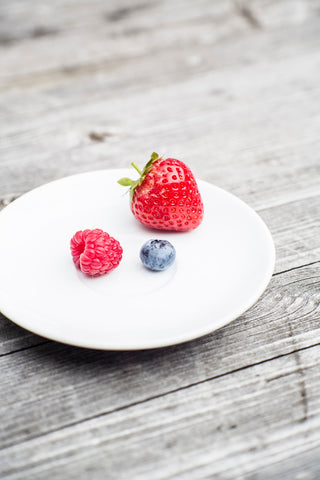Your Cart is Empty
- Shop
- About
- Learn
- Free Domestic Shipping Over $50
- +1(800)929-8935
- Login
- Free Domestic Shipping Over $50
- +1(800)929-8935

 A healthy diet can keep our bodies fit and minds sharp.
A healthy diet can keep our bodies fit and minds sharp.
We've all seen first-hand the adverse effects that a poor diet can have on weight, blood pressure, and even vision.
But our brains are inexorably linked to our diets, as well, and many people don't immediately make the connection between nutrition and brain health. The nutrients we consume each day can influence even feelings of anxiety or depression.
A candy bar now and then won't negatively impact your brain health, but there are some considerations to keep in mind while planning your meals. A chronically sub-standard diet can have severe ramifications on your brain's ability to process new information, recall memories, and regulate your body's many systems.
 Your diet may be keeping you up at night. If you struggle to get a good night's sleep, there may be many factors at play, one of which is the food you eat. Diets high in fat have been found to weaken REM cycles and more frequent sleep disruptions. Overall, studies have found that eating habits which fall in line with general health recommendations are associated with more regular sleep patterns1. However, research into food and sleep is still relatively new, and more studies are underway to confirm these initial findings and help nail down the specifics.
Your diet may be keeping you up at night. If you struggle to get a good night's sleep, there may be many factors at play, one of which is the food you eat. Diets high in fat have been found to weaken REM cycles and more frequent sleep disruptions. Overall, studies have found that eating habits which fall in line with general health recommendations are associated with more regular sleep patterns1. However, research into food and sleep is still relatively new, and more studies are underway to confirm these initial findings and help nail down the specifics.
 Some foods may help ease symptoms of anxiety or depression. There is a proven connection between physical health and mental health, so maintaining a healthy diet is one of the ways many people combat depression and anxiety. Certain teas, like chamomile and green tea, contain L-theanine, an ingredient in Seredyn's Compete Calm formula, which can lower the stress-causing hormone, cortisol2.
Some foods may help ease symptoms of anxiety or depression. There is a proven connection between physical health and mental health, so maintaining a healthy diet is one of the ways many people combat depression and anxiety. Certain teas, like chamomile and green tea, contain L-theanine, an ingredient in Seredyn's Compete Calm formula, which can lower the stress-causing hormone, cortisol2.
Curcumin, a compound found in turmeric, may help the body process omega-3 fatty acids more efficiently. Curcumin also contains powerful antioxidants which may help prevent the onset of anxiety3.
A healthy diet is one way to prevent feelings of depression and anxiety, but it cannot replace treatment from a licensed physician for severe symptoms. It's always a good idea to discuss your diet with your doctor to come up with a comprehensive plan.
 How you feel from day-to-day can be a very abstract concept. It's challenging to draw direct connections between diet and an overall sense of wellbeing, in part because the effects aren't always immediate. But the science is there. Nowadays, we know exactly why we perform better when we eat well and feel lousy when we don't. A poor diet can exacerbate sleep problems as well as increase feelings of depression and anxiety. Many ingredients in everyday foods may increase the likelihood of having adverse effects on your emotional wellness.
How you feel from day-to-day can be a very abstract concept. It's challenging to draw direct connections between diet and an overall sense of wellbeing, in part because the effects aren't always immediate. But the science is there. Nowadays, we know exactly why we perform better when we eat well and feel lousy when we don't. A poor diet can exacerbate sleep problems as well as increase feelings of depression and anxiety. Many ingredients in everyday foods may increase the likelihood of having adverse effects on your emotional wellness.
 We all know that a diet high in sugar puts you at risk of unwanted health conditions and the ramifications that these conditions bring.
We all know that a diet high in sugar puts you at risk of unwanted health conditions and the ramifications that these conditions bring.
The United States is the world's largest producer of corn. Corn manufactured into high fructose corn syrup, a cheap sweetener that's one of the main ingredients in many common foods - from sodas to bread. Indeed, both traditional sugar (sucrose) and high fructose corn syrup are harmful in large amounts. That said, research as shown that high fructose corn syrup is the worse offender between the two.
In multiple studies, diets high in sugar or high fructose corn syrup have correlated with worsening brain health. Research shows us that high fructose corn syrup reduces memory functions, decreases the activation of the brain's satiety centers (how your mind tells you that you're full), and decreases insulin resistance4.
We need sugar to be healthy. The naturally-occurring sugars in fruits and milk, as well as sugars from complex carbohydrates, are vital to supplying energy to the body. Simple sugars and high fructose corn syrup, however, should be approached more cautiously. Lowering your daily intake of these extra sugars will leave you (and your brain) feeling better.
 Processed foods have been shown to contribute to excess visceral fat around the organs, which in turn can cause brain tissue damage5. Many foods are processed, including dairy products and cereals, but it is highly processed foods that pose the most significant risk to brain health. Highly processed foods like sausages, "junk foods," and microwave-ready meals are often full of added salts, sugars, fats, and calories.
Processed foods have been shown to contribute to excess visceral fat around the organs, which in turn can cause brain tissue damage5. Many foods are processed, including dairy products and cereals, but it is highly processed foods that pose the most significant risk to brain health. Highly processed foods like sausages, "junk foods," and microwave-ready meals are often full of added salts, sugars, fats, and calories.
In a study of over 18,000 people published in the Journal of Nutritional Science, showed that a highly-processed diet consisting of many fried foods was found to correlate to lower levels of learning and memory processing as well as overall lower cognitive function6.
Eliminating processed foods from your diet may prove close to impossible, and it is also mostly unnecessary. Many foods, like dairy products, have to be manufactured to be made safe to consume. Instead, try to avoid highly processed foods while balancing everything out with fresh food when you can.
You can identify highly processed foods by looking at their salt, fat, and sugar contents. It can be easy to go over a healthy calorie count with processed foods, so keep an eye on those numbers, as well.
 Refined carbohydrate is a broad term that encompasses many foods, including sugars and processed grains. Refined carbs are known for containing both a high glycemic index and high glycemic load.
Refined carbohydrate is a broad term that encompasses many foods, including sugars and processed grains. Refined carbs are known for containing both a high glycemic index and high glycemic load.
Glycemic index (GI) refers to how fast your body digests carbohydrates. Glycemic load (GL) refers to how much a single serving of carbohydrate raises your blood pressure. Foods with both a high GI and a high GL have been shown to affect the brain negatively.
For those whose calorie intake is more than half refined carbs, there seems to be a higher risk of degenerative brain ailments affecting the mind. Studies looking at this connection suggest that refined carbs contribute to inflammation in the areas of the brain dealing with memory and that this inflammation may accelerate age-related memory loss7.
 In addition to cutting back on unhealthy foods, try to increase your intake of brain-healthy nutrients. These include the omega-3 fatty acids in fish and antioxidants from berries. Whole grains are an excellent way to avoid refined carbs while boosting your vitamin E consumption. Vitamin E may help prevent memory loss and improve overall cognition8.
In addition to cutting back on unhealthy foods, try to increase your intake of brain-healthy nutrients. These include the omega-3 fatty acids in fish and antioxidants from berries. Whole grains are an excellent way to avoid refined carbs while boosting your vitamin E consumption. Vitamin E may help prevent memory loss and improve overall cognition8.
And as we mentioned, an overall healthy diet may ease anxiety and depression or help you sleep soundly through the night.
Remember that the key is trying to keep a balance and that adding healthy foods can be just as important as eliminating unhealthy ones. Your diet can't guarantee you complete immunity from diseases or mental struggles like depression and anxiety, but it is the first step to a healthier you.
(1) St-Onge M, Mikic A, Pietrolungo C (2016 Sep). Effects of Diet on Sleep Quality
(2) White D, de Klerk S, Woods W, Gondalia S, Noonan C, Scholey A (2016 Jan). Anti-Stress, Behavioural Effects of an L-Theanine-Based Nutrient Drink.
(3) Wu A, Noble E, Tyagi E, Ying Z, Zhuang Y, Gomez-Pinilla F (2014 Dec). Curcumin boosts DHA in the brain.
(4) Lowette K, Roosen L, Tack J, Vanden Berghe P (2015 Mar). Effects of High-Fructose Diets on Central Appetite Signaling and Cognitive Function.
(5) Leiden Longevity Study Group (2015 April). Visceral adipose tissue is associated with microstructural brain tissue damage.
(6) Pearson K, Wadley V, McClure L, Shikany J, Unverzagt F, Judd S (2016 Sept). Dietary patterns are associated with cognitive function.
(7) Ozawaa M, Shipleya M, Kivimakia M, Singh-Manouxa A, Brunner E (2016 Jan). Dietary pattern, inflammation and cognitive decline.
(8) La Fata G, Weber P, Mohajeri M (2014 Nov). Effects of Vitamin E on Cognitive Performance during Ageing.